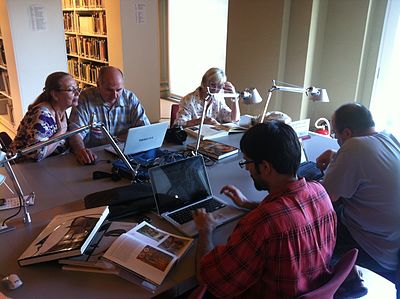Resources

Backstage Pass tour for Wikimedians at the Museu Nacional d’Art de Catalunya, the National Art Museum of Catalonia, in Barcelona, coorganized by the Museum and Amical Viquipèdia while Kippelboy’s residency at the Museum, on July, 30, 2012.
Many learning activities and practice assignments in this course ask you to visit various external websites. You will find links to these resources throughout the course. To support your coursework, use these links and others you find on your own.
To incorporate images in your practice assignments, please check the associated rights on the website or web page where you located the image. Also, you may want to find out the rules, where you live, regarding copyright of materials used for private research and study. A local public, school, or university librarian may be able to assist you with your questions about copyright and whether you can reuse, in your own work, the images you find online.
Suggestions for new resources that broaden the scope and cultural content of the links are especially welcome. You can contact the course development team at Thompson Rivers University, Open Learning, by writing your suggestions on the discussion for this page (click the discussion tab, above).
Here is the reference of the open text, as well as a list of resources used in this course:
Price, P. C., Jhangiani, R., & Chiang, I. (2015). Research Methods in Psychology. (2nd Canadian ed.). Victoria, BC: BCcampus Open Ed.
“Not all scientific studies are created equal” by David H. Schwartz
Developing Effective Search Strategies worksheet by Thompson Rivers University
“Sample PsycINFO Search on EBSCOhost” by the American Psychological Association
“PsycINFO topic guide for Child Development,” by the American Psychological Association
“Using Google Scholar (CLIP)” by Michael Baird, Cooperative Library Instruction Project (CLIP)
“How to Read an Academic Paper” by the iSchool at UBC
Trochim, William M. The Research Methods Knowledge Base, 2nd Edition
“Likert scales: How to (ab)use them” by Jamieson (2004).
“Interpreting Correlations” website
“Spurious Correlations”
“Everyday Research Methods” blog
“Research Randomizer” website
The NOBA Project’s module “Conducting Psychology Research in the Real World,” written by Matthias R. Mehl
Carson, S. H., Fama, J., Clancy, K., Ebert, J., & Tierney, A. (2012). Writing for psychology: A guide for psychology concentrators. Department of Psychology, Harvard University.
Pasek, J. (2012). Writing the empirical social science research paper: A guide for the perplexed.
Resources
Many learning activities and practice assignments in this course ask you to visit various external websites. You will find links to these resources throughout the course. To support your coursework, use these links and others you find on your own.
To incorporate images in your practice assignments, please check the associated rights on the website or web page where you located the image. Also, you may want to find out the rules, where you live, regarding copyright of materials used for private research and study. A local public, school, or university librarian may be able to assist you with your questions about copyright and whether you can reuse, in your own work, the images you find online.
Suggestions for new resources that broaden the scope and cultural content of the links are especially welcome. You can contact the course development team at Thompson Rivers University, Open Learning, by writing your suggestions on the discussion for this page (click the discussion tab, above).
Here is the reference of the open text, as well as a list of resources used in this course:
Price, P. C., Jhangiani, R., & Chiang, I. (2015). Research Methods in Psychology. (2nd Canadian ed.). Victoria, BC: BCcampus Open Ed.
“Not all scientific studies are created equal” by David H. Schwartz
Developing Effective Search Strategies worksheet by Thompson Rivers University
“Sample PsycINFO Search on EBSCOhost” by the American Psychological Association
“PsycINFO topic guide for Child Development,” by the American Psychological Association
“Using Google Scholar (CLIP)” by Michael Baird, Cooperative Library Instruction Project (CLIP)
“How to Read an Academic Paper” by the iSchool at UBC
Trochim, William M. The Research Methods Knowledge Base, 2nd Edition
“Likert scales: How to (ab)use them” by Jamieson (2004).
“Interpreting Correlations” website
“Spurious Correlations”
“Everyday Research Methods” blog
“Research Randomizer” website
The NOBA Project’s module “Conducting Psychology Research in the Real World,” written by Matthias R. Mehl
Carson, S. H., Fama, J., Clancy, K., Ebert, J., & Tierney, A. (2012). Writing for psychology: A guide for psychology concentrators. Department of Psychology, Harvard University.
Pasek, J. (2012). Writing the empirical social science research paper: A guide for the perplexed.
Content is available under the
Creative Commons Attribution Share Alike License.
Privacy Policy | Authors